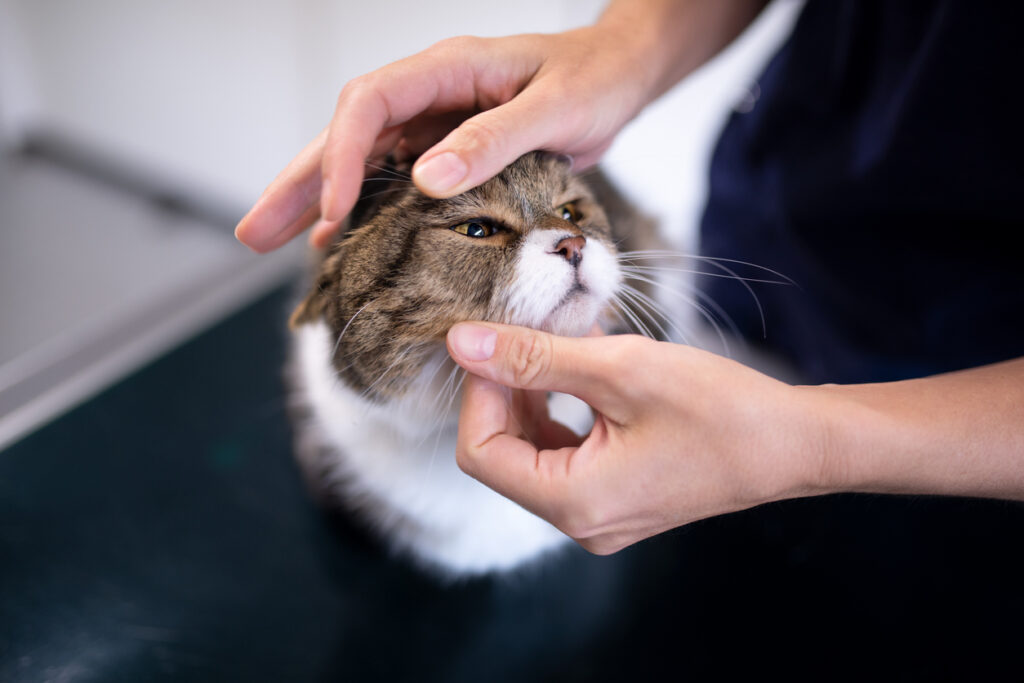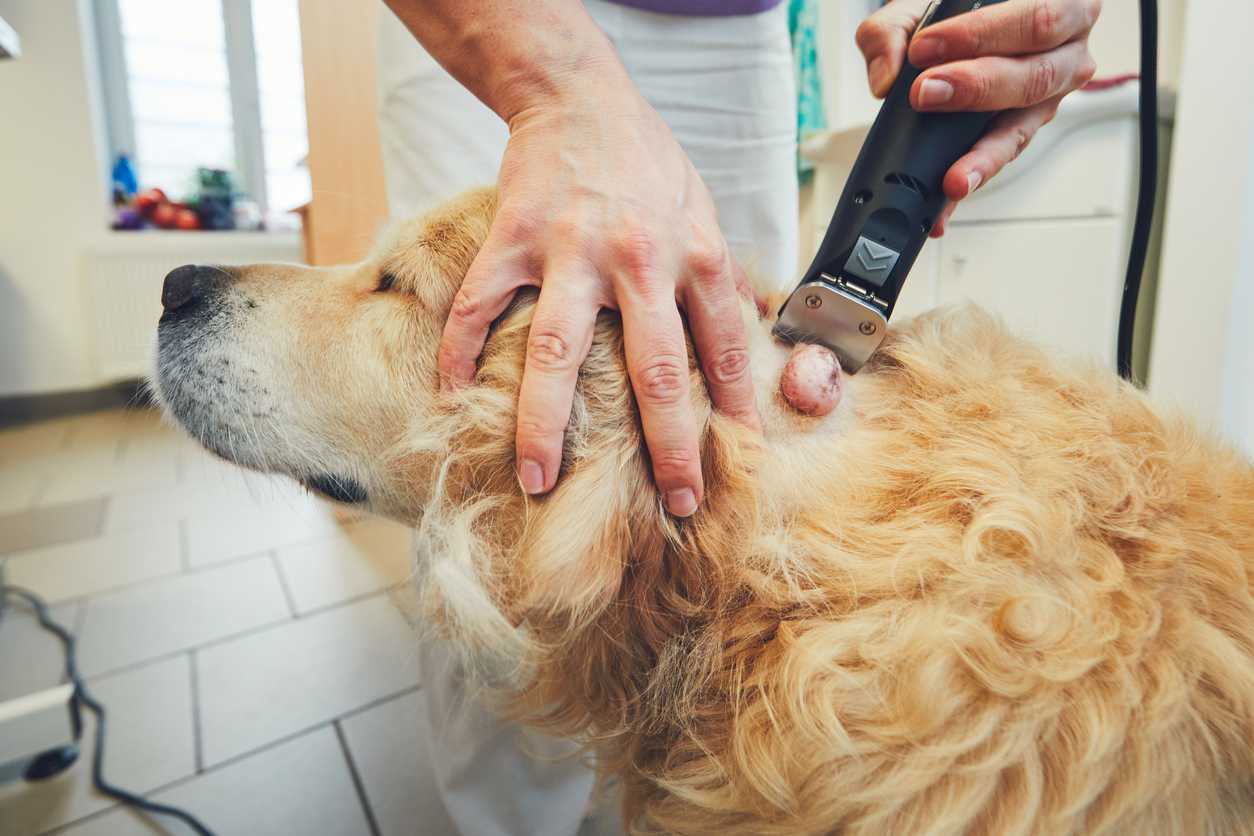Spotting a lump on your beloved pet can be a cause for concern, but it is essential to remember that not all lumps are a sign of something serious. Lumps and bumps are common in dogs, cats, and some exotic pets. Understanding the types of lumps your pet might develop, knowing when to seek veterinary attention, and exploring treatment options like soft tissue surgery are crucial steps in ensuring your pet’s health. In this blog, we’ll guide you through these aspects and how Braescroft Animal Clinic works to provide the best possible treatment for your pet.
Types of Pet Lumps You Might Find on Your Pet
When you find a lump on your pet, your first reaction might be to panic, thinking it could be cancer. However, many types are benign (non-cancerous), which Dr. Lisa Lowenstein can treat or remove surgically. Here are some common types you may encounter on your pet:
Skin Tags
These harmless growths often appear on the skin’s surface, usually on a stalk. Pets, like people, can have single or multiple skin tags on their chest, legs, face, back, armpits, or other areas. They are more common in large-breed dogs but can develop in any breed. Surgical removal is rarely necessary unless your pet begins to chew or scratch them, causing them to bleed.
Lipomas (Fatty Tumors)
Lipomas are non-cancerous fatty tumors. They are usually soft, moveable, and just under the skin. While they can grow quite large, they generally don’t require treatment unless they interfere with your pet’s movement.
Sebaceous Cyst
Sebaceous cysts are large pimples on your pet’s skin caused by clogged oil glands. While harmless, they can become inflamed and sore if they rupture, releasing a white to cream-colored cheesy-looking material. In some cases, ruptured cysts can cause significant inflammation or infection. Surgical removal is typically only necessary if the cysts repeatedly clog, rupture, or irritate your pet.
Histiocytoma
This benign tumor commonly affects pets under a few years of age. Histiocytomas are small, firm, button- or dome-like bumps on the skin’s surface, often found on the face, ears, feet, and front legs. These masses originate from immune cells that protect tissues in contact with the environment. They typically go away on their own within a few months, but surgical removal is an option if they persist.
Malignant (Cancerous Lumps)
Several types of lumps found on pets could be cancerous. Some of the most common include:
- Mast Cell Tumors: Often appearing as raised, red, and sometimes ulcerated lumps, these tumors are one of the most common skin cancers in dogs.
- Melanomas: These can develop on the skin, in the mouth, or in other parts of the body and might appear as dark, pigmented lumps.
- Soft Tissue Sarcomas: These lumps tend to feel firm and are usually located under the skin, often growing slowly but steadily over time.
- Lymphomas: Swollen lymph nodes, which may feel like lumps under the skin, can be a sign of this type of cancer, particularly in areas like the neck, armpits, and groin.
- Squamous Cell Carcinomas: Typically found in areas exposed to the sun, these lumps may look like ulcers that don’t heal and are more common in pets with light-colored skin.
- Mammary Tumors: Common in unspayed female dogs and cats, these lumps can form in the mammary glands and vary in texture and size, with a significant percentage being malignant.
If you find any lump on your pet, it’s essential to have it evaluated by a veterinarian to determine whether it is benign or cancerous and to discuss appropriate treatment options.
What is Soft Tissue Surgery for Pet Lumps?
Soft tissue surgery is a delicate procedure that requires precision and care to remove the growth altogether while minimizing damage to the surrounding healthy tissue. Dr. Lowestein uses advanced techniques and equipment to safely perform these surgeries, reducing the risk of complications and promoting quicker recovery for your pet. By removing these growths, we not only address any immediate concerns, such as discomfort or impaired mobility, but we also prevent the potential spread of malignant cells, ensuring your pet’s long-term health and well-being.
When Surgery is Necessary
While many of these growths are benign, there are cases where surgical removal is necessary, especially if they are causing discomfort, restricting movement, or have the potential to be malignant. At Braescroft Animal Clinic we commonly use this surgery to remove a lump on your pet and other abnormal growths from their body.
Soft tissue surgery is not limited to cats and dogs; it is also an essential treatment option for exotic pets, including rabbits, mice, guinea pigs, and other small animals. Due to their unique anatomy and size, surgery on exotic pets requires specialized skills and techniques to ensure their safety and well-being. Only a veterinarian specially trained in veterinary medicine for exotic pets, such as Dr. Lowenstein, is qualified to diagnose and treat exotic pets. She can handle these delicate procedures, using advanced techniques to minimize risks and promote faster recovery.
Soft Tissue Surgery for Pet Lumps at Braescroft Animal Clinic
We believe in utilizing the highest medical technology, and Dr. Lowenstein is an experienced and highly trained surgeon. We also realize that having your pet undergo surgery can be stressful. We want to assure you that your pet is in good hands and that we will do everything we can to provide the best care possible. We will tell you what you need to know before, during, and after your pet’s surgery. Our goal is to make the entire process go smoothly and eliminate the stress and worry of surgical procedures.
Why is Blood Work Necessary Before Surgery
We perform thorough blood work before any surgical procedure, including removing growths. This step is crucial to assessing your pet’s overall health and ensuring they are fit for surgery. Blood work helps identify any underlying conditions that could affect anesthesia or the healing process, allowing us to tailor the anesthesia and surgical approach to your pet’s needs.
How to Check for Lumps on Your Pet

Regularly checking your pet for lumps is critical because early detection can significantly impact the treatment outcome, especially if the lump on your pet is malignant growth. Your pet’s fur can make it difficult to see any lumps or growths, so it’s essential to run your hands over their entire body regularly, feeling for anything unusual. Also, check inside their mouth if you can do so safely, as oral lumps can sometimes go unnoticed. We recommend performing these checks at least once a month to stay on top of your pet’s health.
Dr. Lowenstein will also thoroughly examine your pet for abnormal growth during regular checkups. If we find any, we’ll explain the procedure for diagnosing and treating the growth, ensuring your pet’s health and comfort. Early detection and professional evaluation are crucial to effectively managing your pet’s well-being.
Conclusion: Play it Safe and Schedule an Appointment with Dr. Lowenstein

It is critical to get any unusual swelling, lumps, or bumps on your pet’s body examined by a veterinarian. Taking a proactive approach to your pet’s health is crucial when managing lumps and growths. By staying vigilant and regularly checking your pet, you can catch potential issues early and seek timely veterinary care. Whether it’s a benign skin tag or a growth that requires surgical intervention, understanding the options available, including soft tissue surgery and specialized care for exotic pets, ensures your pet receives the best possible treatment. Remember, early detection and intervention can significantly affect your pet’s health and quality of life. Schedule an appointment with Braescroft Animal Clinic if you have any concerns, and let us provide the expert care your furry, feathered, or scaly friend deserves.




